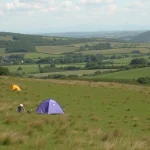Sustainable Travel Methods in the UK Countryside
Choosing sustainable travel UK options benefits both visitors and the environment. Public transport is a practical way to reach rural destinations while reducing carbon footprints. Trains and buses connect many countryside spots, enabling travelers to avoid the emissions associated with private car use.
For those already in the countryside, eco-friendly transport like cycling and walking offers health and environmental advantages. Cycling paths and walking trails often showcase scenic views, making green travel options enjoyable and stress-relieving. To make the most of these methods, carrying lightweight gear and suitable footwear is recommended. These choices also reduce air and noise pollution in peaceful rural areas.
Also read : How can travelers immerse themselves in the UK’s art scene?
Another key component of sustainable travel UK is car sharing and electric vehicle use. Sharing rides reduces the number of vehicles on rural roads, lowering traffic congestion and emissions. Meanwhile, electric vehicles provide a cleaner alternative, especially when charging stations are increasingly accessible in countryside towns. Using a mix of these eco-friendly transport options maximizes sustainability during rural explorations.
By integrating these green travel options, visitors contribute positively to preserving the UK countryside’s natural beauty and making their trips more environmentally responsible.
Also read : Where Can Tourists Discover Hidden Gems in the UK?
Choosing Eco-Friendly Accommodation
Small changes make a big impact
Finding truly eco-friendly accommodation UK options starts with knowing what to look for. Many green hotels feature certifications like Green Tourism or ISO 14001, which ensure they meet rigorous environmental standards. These standards cover energy efficiency, water conservation, waste reduction, and ethical sourcing.
Popular sustainable stays often blend luxury and responsibility. For example, rural retreats in the UK countryside prioritize renewable energy, use organic local food, and integrate natural habitats into their designs. These places not only minimize their carbon footprint but also offer a unique connection to nature.
Booking eco-certified accommodations supports more than just the environment. Choosing locally owned places to stay helps foster the community’s economic health and promotes sustainable tourism. These establishments often engage in local conservation efforts and source products from nearby artisans and farmers, reinforcing the green cycle.
When looking for the best eco-friendly accommodation UK options, seek out certifications and local ownership as primary indicators. Doing so ensures your stay is both enjoyable and aligned with your values of sustainability and responsible travel. This approach contributes positively to local ecosystems and communities while providing you with a memorable, guilt-free stay.
Minimising Environmental Impact
Being environmentally responsible is at the heart of responsible tourism. By adopting smart practices, travellers can significantly help in reducing their footprint on nature.
Managing waste carefully and embracing waste reduction is essential. When outdoors, always carry reusable containers and avoid single-use plastics like bottles or bags. Packing reusable items such as water bottles, utensils, and cloth bags helps prevent littering and reduces environmental strain.
Equally important is sticking to marked trails. Venturing off designated paths may seem harmless but can cause soil erosion and disrupt delicate ecosystems, jeopardising native flora and fauna. Respecting these boundaries protects countryside habitats and preserves natural landscapes for future visitors.
By combining waste reduction with conscientious trail use and actively avoiding plastics, travellers embody responsible tourism in its purest form. Their combined efforts lead to a lowered environmental footprint, promoting conservation and ensuring that the beauty of outdoor spaces remains intact for all.
Respecting Wildlife and Local Communities
small steps lead to significant positive impact
When exploring the countryside, wildlife protection UK demands that visitors maintain safe distances from animals and avoid disturbing their habitats. Approaching too closely or causing noise can stress wildlife, disrupting feeding and breeding behaviours essential for survival. Following the countryside code is crucial—this includes sticking to designated paths, leaving gates as found, and not littering. These simple rules uphold the balance between enjoyment and preservation.
Respecting local communities involves more than just observation. Ethical countryside travel means supporting local businesses and traditions responsibly. Choosing local produce, crafts, and services helps sustain rural economies and enriches your experience. Always ask for permission before crossing private land or engaging with community events, showing courtesy to residents who cherish their privacy and heritage.
Understanding these responsibilities fosters a meaningful connection with the environment and its people. By championing respect local communities alongside wildlife protection UK, visitors become stewards rather than mere observers. This balanced approach ensures the countryside remains vibrant and welcoming for future generations, blending enjoyment with ethical awareness.
Low-Impact Outdoor Activities
Engaging in low-impact activities offers an excellent way to enjoy nature while preserving its delicate ecosystems. These eco-friendly things to do prioritize minimal environmental disturbance, supporting sustainable outdoor recreation that benefits both participants and wildlife.
Guided nature walks and birdwatching stand out for their accessibility and low ecological footprint. Guided walks educate participants about local flora and fauna, encouraging respect for habitats. Birdwatching, requiring only quiet observation and binoculars, allows you to connect deeply with wildlife without causing harm.
Water-based pursuits like canoeing, kayaking, and paddleboarding also qualify as low-impact activities when practiced responsibly. These activities do not use motors, which reduces noise and water pollution, making them excellent options for exploring lakes and rivers without disrupting aquatic ecosystems.
For those looking to get involved more actively, foraging responsibly and participating in conservation volunteering are compelling choices. When done with knowledge and care, foraging helps one understand native plants and contribute positively. Conservation volunteering encourages stewardship of natural spaces, reinforcing sustainable outdoor recreation ideals.
By choosing these eco-friendly things to do, you help protect natural habitats, ensuring that outdoor adventures can be enjoyed by future generations.
Useful Resources and Organisations for Sustainable Exploration
Helping you discover greener travel options
In the UK, several sustainable tourism resources provide invaluable support for travelers committed to eco-friendly choices. Organisations like The Sustainable Tourism Network UK offer guidance on reducing environmental impact while exploring. Another key player, Green Traveller UK, promotes responsible travel initiatives through informative campaigns and partnerships with local businesses.
Online platforms extend this support by delivering accessible green travel planning tools. Websites such as EcoTravelPlanner allow users to select low-impact accommodations, eco-friendly transport options, and locally sourced experiences. These tools simplify the process of aligning your itinerary with responsible travel initiatives, making greener choices more achievable.
Locating and engaging with local sustainability initiatives is equally important. Many regions have dedicated community-led projects focusing on conservation and cultural preservation. Travelers can often find these by visiting municipal websites or checking out national park portals, which highlight eco-friendly activities and educational programs.
By utilizing these key sustainable tourism resources in the UK and tapping into eco-friendly travel organisations, visitors can contribute actively to preserving destinations’ natural beauty and cultural heritage. Taking advantage of available responsible travel initiatives ensures that your journey leaves a positive legacy for both the environment and local communities.





